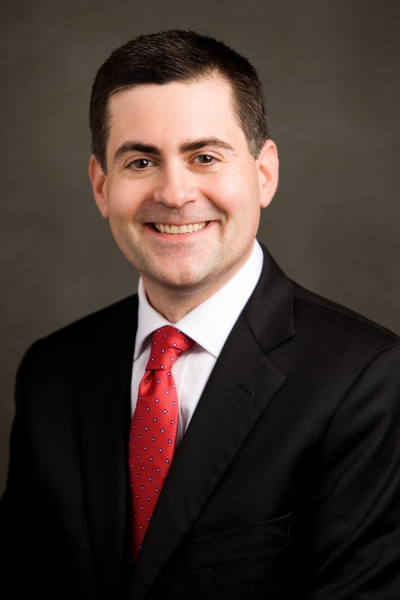Russell Moore: Southern Baptists, Don't Let Donald Trump Divide Us

What does a family Christmas look like after a divisive election?
A little over a month out from the 2016 elections, this is the question I've been thinking about recently. As many Americans travel home to see family, many of you are bound to be on the receiving end of heated political conversations. Some of you may be visiting family who are upset about how you voted. Others of you may deal with family who are upset about things you did or didn't say. Still others of you may be disappointed with how a family member advocated or debated.
I can understand that. Over the last month, there have been some pointed conversations in my denominational family about the election and the way forward, and some of them have been directed at me. But it also raises a broader question worth considering: as Christians, how should we move forward in this Christmas season and beyond?
First, try to see where there are misunderstandings. I remember one situation where I witnessed a handful of Christian political operatives excusing immorality and confusing the definition of the gospel. I was pointed in my criticisms, and felt like I ought to have been. But there were also pastors and friends who told me when they read my comments they thought I was criticizing anyone who voted for Donald Trump. I told them then, and I would tell anyone now: if that's what you heard me say, that was not at all my intention, and I apologize. There's a massive difference between someone who enthusiastically excused immorality and someone who felt conflicted, weighed the options based on biblical convictions, and voted their conscience. In a heated campaign season focused on sound bites, this distinction can get lost in the headlines, so it bears repeating.
For many of you, you may find yourself in situations where you haven't been clear in what you're saying and what you're not saying. I know I have. That's true not only in an election year but anytime. Try to find out when those times are.
Second, as Christians, particularly as it comes to this election, we need to make sure we have empathy for one another. When I went to the ballot box this year, for the first time in my life my conscience wouldn't allow me to vote for either major party candidate. For me, to vote for either candidate, I felt, would be to sin against my own conscience. That said, many Christians, including some of my very best friends and closest ministry partners, approached the ballot box conflicted but felt compelled to cast a ballot for the "lesser of two evils," hoping for the best with a less than ideal president. A possible temptation in situations like this is to take things personally — something I've been guilty of myself — but it's important that we not.
This is important because, regardless of which side you're on, as Christians we are called to honor everyone (1 Pet. 2:17), and we ought to take the time to understand and not caricature one another. So, if you voted but your conscience wouldn't allow you to vote for either major candidate, don't stand in judgment over a Christian who prayerfully came to a different conclusion. Remember, whether it was concern for the unborn, the Supreme Court, or any number of other issues, most often it was a commitment to biblical convictions that motivated his or her vote.
On the other hand, if you find yourself frustrated with someone whose conscience would not allow a vote for either major party candidate, don't stand in judgment over that decision either. Most often, these voters were animated by biblical motivations too: many felt either that they could not sin against their conscience (Rom. 14:23) or that a vote for an ethically-compromised candidate would implicate them personally and be akin to "do[ing] evil that good may come" (Rom. 3:8). In either case, we all owe it to our brothers and sisters in Christ to understand their convictions and be slow to judgment when biblical motivations are the primary motivators. In the heat of an extraordinarily divisive campaign, that is something all of us, myself included, are wise to remember.
Third, don't ignore your conscience. Regardless of how we voted, I think we can all agree that 2016 has been fraught with ugliness, much of which couldn't be left unchecked. In my personal situation, there were some outrageous moments in the midst of the campaign that I felt compelled by my job to address. When those moments came, occasionally I was tempted to remain silent for the sake of the "team" or the issues at stake. After all, these issues are the ones I've spent my life defending and the ones my denomination has been vocal and insistent about for decades. Even still, in my case, it is precisely because Southern Baptists are pro-life, pro-family, pro-religious freedom, pro-racial reconciliation, and pro-character-in-public-office that I felt it was my responsibility to speak out on those issues. For me, to remain silent — rightly or wrongly — felt negligent.
This election year reminds me somewhat of the history we've all learned of the Vietnam war era. Back then, there were kitchen tables and even marriages sharply divided on the issue. Two mistakes could have, and often did, come out of this. One mistake would be for those families to remain divided, and not speaking. The other mistake would have been for those families to conclude that the way to avoid such division in the future is to stop worrying about matters as important as war and peace, life and death.
The same could be true this year. On the one hand, we could conclude that it's just not worth ever talking about issues of character and conscience, of what it means to repent and believe in Christ, of human dignity for all people. That would be a mistake. The opposite tragedy would be never to move past election day and constantly war with one another about who was right in the midst of the campaign. Too much unites us as Christians, and too much is at stake with the issues we all care about to be permanently entrenched in intramural warfare. Now that the election is over, as Christians we owe it to Donald Trump to pray for him (1 Tim. 2:1-2) and give honor to whom it is due (Rom. 13:7), and as responsible citizens we owe it to him to work with him for the common good everywhere possible.
The good thing about an election year though, regardless of how important the consequences, is that elections are about temporal matters. The United States, and every other nation, will one day pass away before the reign of God. Christmas reminds us of what is ultimately of more importance than what is debated on cable news and across social media platforms. The first Christmas, after all, wasn't about how many terms Quirinius served as governor or how many subjects were counted in Caesar's census. The glory of that Christmas was found where no one was looking, except for those who were directed by God. The glory of that Christmas was in a feeding trough, where the Word became flesh, and dwelled among us. That's true this Christmas too, even in an election year like this.
Originally posted at russellmoore.com.





























